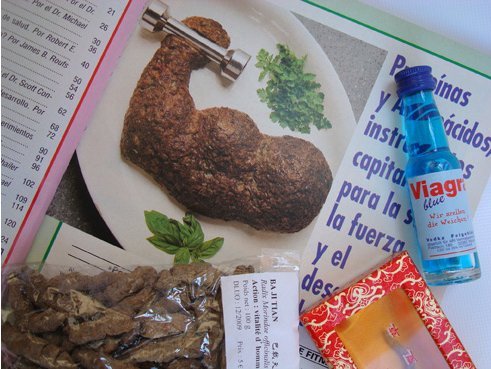3/6/2008
Power Food
Artium, Vitoria-Gasteiz
by Miralda-FoodCultura

Power Food is the compelling title of the project conceived by Miralda-FoodCultura, based on a very particular view of the culture of food and alimentation. For two years now, the FoodCultura team, led by the artist, has worked on this poetic and forceful image of food in a universal anthropological setting. The exhibition proposes a network of connections that link food with energy and medicine and, at the same time, with rituals, tradition, beliefs and popular culture. Lastly, it analyses the relationship between this basic need and the control, marketing and representation of power. In other words, it takes a look at the main driving forces behind our culture, economy and social relations.
Food shares the same universe with all the other primary needs, and together with this, drink and shelter, but also sex, affection and the feeling of belonging to a group, can be seen as the origin of the objects and concepts dissected in this project, articulated in a language that is both simple and effective. Bright colours, a popular kitsch aesthetic and the use of the colours of seduction that link the object with success in social relations or in health, guide us through the exhibition, creating a sensation that lies somewhere between fascination, recognition and surprise.
With a highly unconventional approach, the exhibition is structured in three very different areas.
The first of these analyses the relationship between food and medicine, tradition and its ritual connections, beliefs and their links with the present. The aphrodisiac values associated with armadillo meat are also applicable today to viagra. From wizards and recipe books of popular medicine to today’s tonics, over the years the presentation of products has been extremely significant, but involves the same factors of trust, knowledge and reticence. This area highlights the world of magical powers, the practice of natural medicine and the properties of drugs and medicines through home remedies in the Basque Country, reptiles and Chinese mushrooms, energy drinks or performance enhancing products in the world of sport.
Visitors leave this gallery through an arch of medicinal herbs gathered in our mountains, to explore, in the second gallery, the connections between food and our popular culture and the iconography created around this; the situation before and after consuming foods, potions or miracle waters. Dr. Jekill and Mr Hide share the same space with witches and Popeye`s spinach. Due to a typing error, spinach was attributed an amount of iron far in excess of what it really contains, giving it a mythical status in children`s alimentation. All of them are paradigms of many of the customs, representations and beliefs of modern culture. The gallery contains several film projections, posters, recipes and advertising slogans, together with containers whose forms represent the powers of the substance they contain: small jars with religious and anthropomorphic images; decanters with the shape of a phallus, etc., in a direct transformation of food into concepts, in other words, our own culture.
The last section examines the relationships established between food, economics and the representation of power. Prestige and social status are clearly reflected in food. The exhibition analyses diets, the calorie value of foods and the nutritional pyramid, as well as reflecting on power, consumption and its representations through a number of different objects. From the religious chalice to the tin of diamonds. The gallery includes bullet-tins that link power and energy in the same image. Seven tables bearing the "forbidden" sign contain documentation offered, in turn, as a support to reflect upon the prohibitions that, for social or religious reasons, are imposed on food.
With the same ironic manner of looking at the world of energy drinks, and with the same commercial aesthetic, Miralda-FoodCultura has devised an edition of tins of carbonated water. Water presented as a source of energy for life, as the true energy drink.
The project presents without ambiguity the attraction felt by Miralda-FoodCultura for iconography, popular customs and beliefs and analyses and unravels these using down-to-earth language. From a conceptual viewpoint, their work exposes with irony, respect and fascination the circle created between food, culture, energy and power.
Power Food is a production by ARTIUM (Vitoria-Gasteiz) and Es Baluard (Palma de Mallorca)
Comunication: Anton Bilbao abilbao@artium.org - bgodino@artium.org
Artium de Álava. Centro-Museo Vasco de Arte Contemporáneo
Francia 24, 01002 Vitoria-Gasteiz



